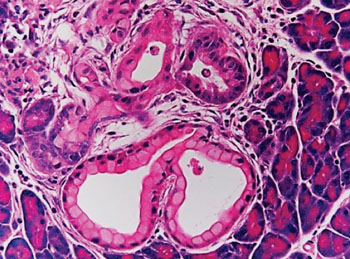Genomic Analyses Identifies Molecular Subtypes of Pancreatic Cancer
By LabMedica International staff writers
Posted on 07 Mar 2016
Most patients with pancreatic cancer only live a few months after diagnosis and the disease is set to become the second most common cancer in westernized countries in the next 10 years.Posted on 07 Mar 2016
A detailed analysis of DNA disruption, gene expression and molecular pathways in hundreds of tumors, has led to the conclusion that pancreatic cancer is not one but four separate diseases, each with a different genetic trigger and requiring a different treatment.

Image: Histopathology of two clusters of precancerous cells (lower half of image), which arose in pancreatic cells expressing the pancreas/duodenum homeobox protein 1 and the cancer gene KRAS (Photo courtesy of Sharon Friedlander).
An international team led by Australian scientists at the University of Melbourne (Australia) have studied the genetics of pancreatic cancer, revealing it is actually four separate neoplasms, each with different genetic triggers and survival rates, paving the way for more accurate diagnoses and treatments. The team identified 32 genes from 10 genetic pathways that are consistently mutated in pancreatic tumors, but further analysis of gene activity revealed four distinct subtypes of tumors.
The team analyzed the genomes of 456 pancreatic tumors to identify the underlying genetic and molecular processes that go wrong inside cells when normal pancreatic tissue changes into aggressive cancer. Using an approach called "integrated genomic analysis," the team brought together techniques that analyze not only genetic code, but also variations in structure and gene activity. This is the first time such an analysis has revealed so much about the genetic damage that leads to pancreatic cancer.
Expression analysis defined four subtypes: (1) squamous; (2) pancreatic progenitor; (3) immunogenic; and (4) aberrantly differentiated endocrine exocrine (ADEX) that correlate with histopathological characteristics. They found some types of pancreatic cancer have mutations typically seen in colon cancer and leukemia, for which treatments are already available. Immunogenic tumors contained upregulated immune networks including pathways involved in acquired immune suppression.
Sean M. Grimond, PhD, a professor and coauthor of the study, said, “We identified 32 genes from 10 genetic pathways that are consistently mutated in pancreatic tumors, but further analysis of gene activity revealed four distinct subtypes of tumors. This study demonstrates that pancreatic cancer is better considered as four separate diseases, with different survival rates, treatments and underlying genetics. Knowing which subtype a patient has would allow a doctor to provide a more accurate prognosis and treatment recommendations.” The study was published on February 24, 2016, in the journal Nature.
Related Links:
University of Melbourne













